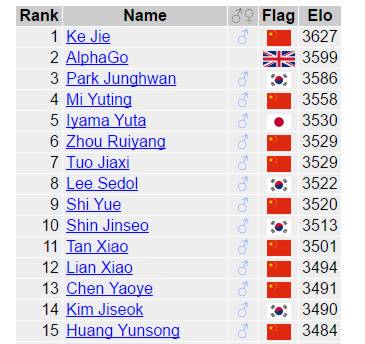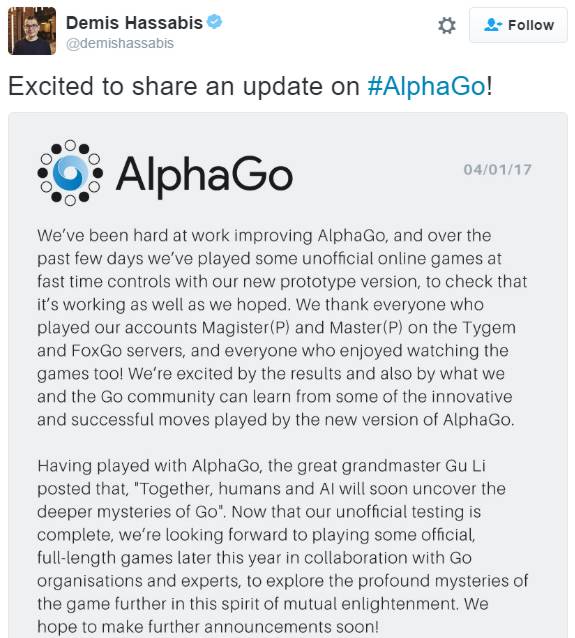| AlphaGo Revealed As Mystery Player On Winning Streak |
| Written by Sue Gee | |||
| Friday, 06 January 2017 | |||
|
A mysterious unknown Go player appeared on Chinese online platforms at the end of December and beat the world's top ranked players one after another. On January 4th Google DeepMind's Demis Hassabis revealed the player to be a new prototype version of AlphaGo. Google's neural-network based AI, AlphaGo made history in 2016 by beating Lee Sedol, a Korean Go Player who had been the World's No. 1 player for 5 years beween 2006 and 2011 in a match in which AlphaGo only lost one of five matches. Then in June Ke Jie, in his capacity as the world's best Go player proposed a further "ultimate man-machine war" in which he proposed to take on AlphaGo himself. Some doubt was cast on this proposal by head of the DeepMind project, Demis Hassabis who tweeted: "we've not yet decided yet what to do next with AlphaGo, once we have, there will be an official announcement [on Twitter]." However, when DeepMind was ready to go back into action there was no announcement, official or otherwise, instead AlphaGo took a clandestine route to toppling the worl'd top ranking players. Starting on December 29th, 2016, a newcomer used the account names Magister and Master on the Tygem and FoxGo servers and caused quite a stir among players and observers alike. Master defeated a long list of top Go players including Korea’s Park Jung-hwan, rated No. 3 in the world, Japan’s Iyama Yuta (No. 5) and China's Ke Jie who has held the No. 1 spot since mid 2014.
Partly due to the speed at which Master played and the use of decidedly "non-human" moves there had already been speculation that the mystery player was an AI rather than a human. And this was confirmed by Hassabis who tweeted the following message:
It wasn't just Hassabis who came clean, the user registered as "Master" provided his real identity - AlphaGo's Doctor Huang, a member of the Google DeepMind team - on foxwq.com. While Ke Jie still has his No. 1 ranking AlphaGo is already No. 2 and it seems doubtful that any human will ever beat it again. This is something that Ke Jie is finding hard to accept. Ali Jabarin, a professional Go player, who came across Ke soon after one of his defeats by the AI reported: "He [was] a bit shocked... just repeating 'it's too strong.'" After his first two losses, Ke posted to Weibo: “I have studied Go softwares for over half a year since March, learning theories and putting them into practices countless times. I only wondered why computers are better… Humans have evolved in games in thousands of years—but computers now tell us humans are all wrong. I think no one is even close to know the basics of Go.” Ke was, however, still hopeful he had "one last move" to defeat the AI and on January 4th, after AlphaGo's identity had been made public, he posted that he had already guessed that fact and had been determined to show that humans could win at least one game writing: “If I were not in hospital, I would have used the one last move I prepared for a week… It’s a little shame". As Mike James pointed out in Why AlphaGo Changes Everything the advances made by DeepMind are by no means limited to the realm of Go, or even that of games. They have universal applicability and in 2016 we saw advances in convolutional networks for vision and recurrent neural networks for memory, language understanding and so on. In 2017 what more can we expect. Related ArticlesWorld Champion Go Player Challenges AlphaGo AlphaGo Beats Lee Sedol Final Score 4-1 Why AlphaGo Changes Everything Google's AI Beats Human Professional Player At Go Google's DeepMind Learns To Play Arcade Games Microsoft Wins ImageNet Using Extremely Deep Neural Networks
To be informed about new articles on I Programmer, sign up for our weekly newsletter, subscribe to the RSS feed and follow us on Twitter, Facebook or Linkedin.
Comments
or email your comment to: comments@i-programmer.info
|
|||
| Last Updated ( Tuesday, 11 April 2017 ) |

 Master won successive 51 games before his 52nd rival, Chen Yaoye (No.13), went offline, forcing the game to be recorded as a tie and by January 4th had clocked up 60 wins, that single draw and no losses.
Master won successive 51 games before his 52nd rival, Chen Yaoye (No.13), went offline, forcing the game to be recorded as a tie and by January 4th had clocked up 60 wins, that single draw and no losses.


